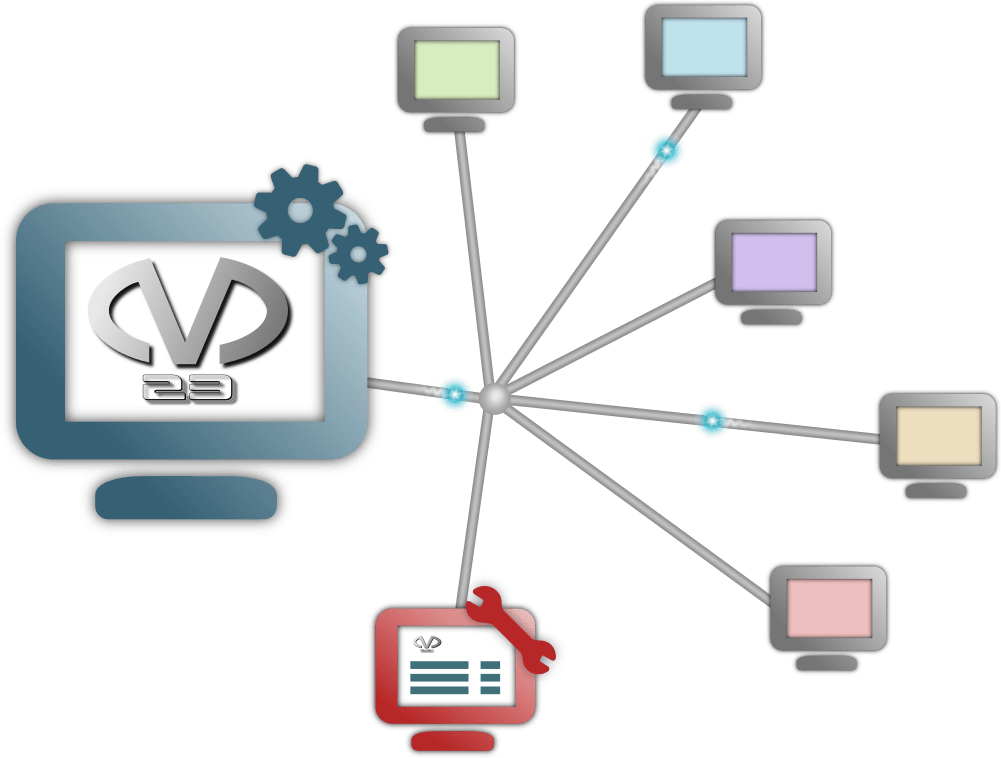
Network Deployment for Linux
Nur einen Moment... / Just a moment...
Freie Software und Bürgerrechte benötigen Deine Aufmerksamkeit!
Handeln gegen Überwachungsstaat und Softwarepatente
Wenn Du auch in Zukunft in einem Staat leben möchtest, der nicht dem Überwachungsstaat aus "1984" gleicht, und/oder Du möchtest, dass weiterhin jede(r) Software entwickeln und vertreiben kann, gibt es verschiedene Möglichkeiten, sich zu engagieren. wir möchten Dir diese fünf Organisationen empfehlen:
Free software and civil rights need your help!
Act against police state and software patents
If you don't want to live in a state à la "1984" and you want that development and distribution of software should remain legal for everyone, then you have different possibilities to get into the act. We would like to recommend these five organisations:

available for Ubuntu 18.04
With Ubuntu 18.04 LTS "Bionic Beaver", we are proud to add one more distribution to the list of distributions that can be installed with m23. We also include a set of pre-configured desktop environments. Users of the Univention Corporate Server can now get the m23-App for UCS 4.3 from the Univention App Center. And of course, several minor improvements have been made to make m23 even easier to use.
Ubuntu 18.04From this version on, m23 offers support for Ubuntu 18.04 LTS as a distribution for the clients, with all the features that you're used to from the other distributions. This includes an incredible number of 7 pre-configured desktop environments: Mate, Gnome 3, LXDE, Budgie, KDE, Xfce as well as the Gnome-based Ubuntu standard desktop. The desktop configuration changes made by m23 to the Ubuntu standard desktop are limited to the removal of the shopping icon and the deactivation of the first start dialog of Gnome. m23 allows to install the 64- and 32-bit variants, no matter which desktop environment is selected.
VirtualizationThe VirtualBox-based integrated virtualization has received multiple improvements and was slightly adapted. Virtual machines (VMs) that have been created with m23 can now also run on a Ubuntu 18.04 host. A new option for the CPU architecture is now available when creating a new VM from the m23 interface, which makes it possible to create both 64 and 32 bit systems. The m23 interface now always displays the credentials for accessing the m23 VM console, independently from the current state of the VM. A hint notifies you when the virtualization software has already been set up on an m23 client.
m23 app for UCS 4.3From this m23 version on, the m23 app is available for UCS 4.3. Compared to m23 servers running natively on Debian (or Raspbian), the feature set of m23 on UCS is still slightly restricted, to avoid collisions with UCS-specific services. However, the possibility to save home directories of m23 clients on a central NFS server has now been unlocked.
Changes to the interface
The m23 interface has been polished a bit to give m23 administrators clearer hints about the current state of the m23 system and to optimize working with m23 in other ways.
In the selection dialogs for client groups and for package selections that shall be installed, selectable elements now display a checkbox (with and without check mark).
In the client overview, "Repeat tasks" is available as an additional recovery option, and also allows to re-install a whole number of clients at the same time.
When creating a client, the MAC address can now also contain colons, to make copy-pasting from other software programs easier. The colons will be filtered out by JavaScript and when saving on the m23 server.
In the control center, a new icon for setting up the client has been added.
The dialog for package installation has been extended by a hint about updating the package index, which will be displayed when the search gives no results. The search dialog displays an info text, when the search term contained invalid characters. Additionally, waiting animations are now displayed during search and kernel list updating.
While formatting as ext4, the feature "metadata_csum" is now deactivated, as it led to the checking aborting with older versions of fsck. The m23 server now regularly purges cached apt package lists, that are used for searching for packages for the corresponding m23 client. This helps avoid running out of disk space on (small) disks, if a large number of clients is managed by m23. If a device with a vastly diverging BIOS date (e.g. because of an empty CMOS battery) is used as an m23 client, this could lead to issues with the SSL certificate. At the beginning of the installation, the m23 client now fetches the current time from the m23 server and adjusts its own time when there is a larger difference between the two times. m23 deactivates the systemd apt-daily.timer, which can collide with m23 installation jobs. The base installation was extended by the packages "command-not-found" and "bash-completion", which make using the command line a little bit more comfortable. Slow package searches, especially with slow internet connection, will be sped up a lot from now on. Due to a bug, the package index has been downloaded for each new search. Now, once downloaded, the package index will be used until it's either outdated or is updated manually (as was intended). When updating the package index in the package architect, it wasn't always certain that really just the latest version of a Debian package would be kept. The new sorting functionality should now also take unusual package names into account and really delete the older packages.
Downloads / Update
The latest version is available as an update from the m23 interface, via apt (Note: Package source server for m23-specific packages is now "deb http://m23inst.goos-habermann.de ./". Setup is described in the installation guide), as ISO file for creating an m23 server installation medium, as pre-installed virtual machine or as RaspberryPi image file (the latter three can be found in the Download section).





